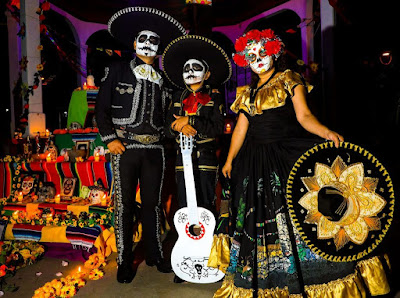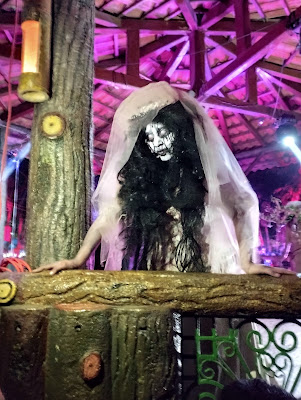The Lutheran Trifecta: The Part with Saints and Spooky Tales
Día de los Santos - All Saints Day
is a Christian holiday, celebrated in a variety of ways depending on theological, geographical and cultural tradition. In our Lutheran Church community in El Salvador, this is the day on which legends are brought to life.
Here's a bit of old school history: The description of a feast day in commemoration of multiple saints or martyrs can be found in writings from the early times of the church (prior to 400 C.E.). In the late 700's C.E., Pope Gregory III is said to have dedicated a chapel in honor of all saints and martyrs on the date of November 1st, and by the 800's C.E. the Festival of All Saints is widely recognized and celebrated on this date.
In medieval England, the Feast of All Saints (also known as All Hallows Day or Hallowmas) was celebrated as part of All Hallowtide, a 3-day observance from October 31 (Halloween) to November 2 (All Souls Day). All Saints Day was designated as a holy day of obligation by the Roman Catholic Church, in commemoration of all of the historic saints and martyrs who now reside in heaven - those officially recognized by the church as well as those who many not be known. A second day of commemoration, All Souls Day (November 2), was observed as a day to remember all who have died in the faith (such as family members and friends). These two dates continue to have theological and cultural importance in the Roman Catholic tradition. (Refer to Encyclopedia Britannica.)
As part of his theological study which led to the Reformation, Luther described a new understanding of the biblical word "saint" to mean "believer." For Lutherans, there is typically one day of celebration, All Saints Day, on which all believers who have passed on from this world, are remembered. Because Reformation Day and All Saints Day occur one after the other, Lutheran Churches commonly celebrate these two festivals on consecutive Sundays: the last Sunday of October, and the first Sunday of November.
In El Salvador, All Saints Day is not an official holiday. November 1st is a day on which faithful Catholics attend mass. Otherwise it is a regular work day and a time of preparation for going to the cemetery the next day. This year, the city of Suchitoto held its second Día de los Muertos celebration on November 1st, incorporating many traditions most commonly found in Mexico. The celebration is designed to promote tourism. It included a fire show, live music, a showing of the movie Coco, and a concurso de catrinas (literally a ladybug contest; ladybug refers to faces painted to represent skulls adorned with flowers).
 |
| The winners of the Catrinas contest (photo by David Martínez, DiarioElSalvador.com) |
The uniquely Salvadoran Fiesta de la Calabiuza has been celebrated in Tonacatepeque for many years. We have participated in the festivities a few times. Spooky legends from the region are brought to life with screams and laughter during the evening parade. These legends are told and retold by local folk by candlelight in the dark of night. In this video, you might hear screams coming from the squeaky cart or catch a glimpse of el cadejo.
Video used with permission from a friend
Fiesta de la Calabiuza in Tonacatepeque
November 1, 2022
Over the last year, the cultural house in Tonacatepeque increased its programming to preserve, teach and promote local stories and traditions. Many of the spooky legends are like fables, some with an origin in the church or related to the church (like the headless priest). Saints and spirits and spooks...it's a good time to light a candle.
Salvadoran Lutheran Church All Saints Sunday celebrations are very similar to those celebrated in Lutheran congregations throughout the world. Stories of historic saints may be shared as inspirational examples of lives lived out in faith and love. Congregants remember their dear ones and light candles in their honor. Special attention is given to the families who have lost a beloved one within the past year. It's a time for the community to come together and support one another.
If you have lost someone dear to you, may God comfort you in your tears. May your beloved's memory be a blessing in your life. May you find a community that mourns with you and supports you.
Read the first story in this 3-part series: The Lutheran Trifecta: The Part with Balloons
Read a related story: Days of Saints and the Dead




Comments
Post a Comment